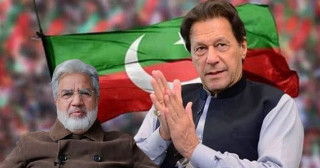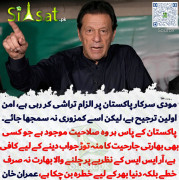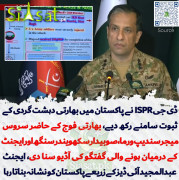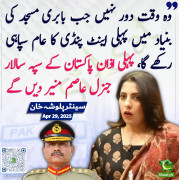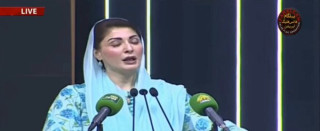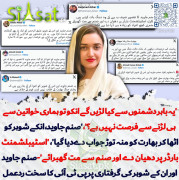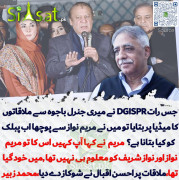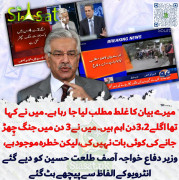Translation of Surah al-Furqaan (Verse 63-76)
Salam!
Below are some attributes of Saints as represented in one passage of the Glorious Qur'an. Indeed a worthy read;Attributes of Awliyaa’Allaah
[Excerpt From Surah al-Furqaan (Verse 63-76)]
25:63 وَعِبَادُ الرَّحْمَـٰنِ الَّذِينَ يَمْشُونَ عَلَى الْأَرْضِ هَوْنًا وَإِذَا خَاطَبَهُمُ الْجَاهِلُونَ قَالُوا سَلَامًا
Yusuf Ali 25:63: And the servants of ((Allah)) Most Gracious are those who walk on the earth in humility, and when the ignorant address them, they say, "Peace!";
25:63: اور رحمنٰ کے بندے وہ ہیں جو زمین پردبے پاؤں چلتے ہیں اورجب ان سے بے سمجھ لوگ بات کریں تو کہتے ہیں سلام ہے
25:64 وَالَّذِينَ يَبِيتُونَ لِرَبِّهِمْ سُجَّدًا وَقِيَامًا
Yusuf Ali 25:64: Those who spend the night in adoration of their Lord prostrate and standing;
25:64: اور وہ لوگ جو اپنے رب کے سامنے سجدہ میں اور کھڑے ہوکر رات گزارتے ہیں
25:65 وَالَّذِينَ يَقُولُونَ رَبَّنَا اصْرِفْ عَنَّا عَذَابَ جَهَنَّمَ ۖ إِنَّ عَذَابَهَا كَانَ غَرَامًا
Yusuf Ali 25:65: Those who say, "Our Lord! avert from us the Wrath of Hell, for its Wrath is indeed an affliction grievous,-
25:65: اور وہ لوگ جو کہتے ہیں اے ہمارے رب ہم سے دوزخ کا عذاب دور کر دے بے شک اس کا عذاب پوری تباہی ہے
25:66 إِنَّهَا سَاءَتْ مُسْتَقَرًّا وَمُقَامًا
Yusuf Ali 25:66: "Evil indeed is it as an abode, and as a place to rest in";
25:66: بے شک وہ برا ٹھکانا اوربڑی قیام گاہ ہے
6725: وَالَّذِينَ إِذَا أَنفَقُوا لَمْ يُسْرِفُوا وَلَمْ يَقْتُرُوا وَكَانَ بَيْنَ ذَ*ٰلِكَ قَوَامًا
Yusuf Ali 25:67: Those who, when they spend, are not extravagant and not niggardly, but hold a just (balance) between those (extremes);
25:67: اوروہ لوگ جب خرچ کرتے ہیں تو فضول خرچی نہیں کرتے اور نہ تنگی کرتے ہیں اور ان کا خرچ ان دونوں کے درمیان اعتدال پر ہوتا ہے
25:68 وَالَّذِينَ لَا يَدْعُونَ مَعَ اللَّهِ إِلَـٰهًا آخَرَ وَلَا يَقْتُلُونَ النَّفْسَ الَّتِي حَرَّمَ اللَّهُ إِلَّا بِالْحَقِّ وَلَا يَزْنُونَ ۚ وَمَن يَفْعَلْ ذَ*ٰلِكَ يَلْقَ أَثَامًا
Yusuf Ali 25:68: Those who invoke not, with Allah, any other god, nor slay such life as Allah has made sacred except for just cause, nor commit fornication; - and any that does this (not only) meets punishment.
25:68: اوروہ جو الله کے سوا کسی اور معبود کونہیں پکارتے اور اس شخص کوناحق قتل نہیں کرتے جسے الله نے حرام کر دیا ہے اور زنا نہیں کرتے اور جس شخص نے یہ کیا وہ گناہ میں جا پڑا
25:69 يُضَاعَفْ لَهُ الْعَذَابُ يَوْمَ الْقِيَامَةِ وَيَخْلُدْ فِيهِ مُهَانًا
Yusuf Ali 25:69: (But) the Penalty on the Day of Judgment will be doubled to him, and he will dwell therein in ignominy,-
25:69:قیامت کے دن اسے دگنا عذاب ہو گا اس میں ذلیل ہو کر پڑا رہے گا
70 إِلَّا مَن تَابَ وَآمَنَ وَعَمِلَ عَمَلًا صَالِحًا فَأُولَـٰئِكَ يُبَدِّلُ اللَّهُ سَيِّئَاتِهِمْ حَسَنَاتٍ ۗ وَكَانَ اللَّهُ غَفُورًا رَّحِيمًا
Yusuf Ali 25:70: Unless he repents, believes, and works righteous deeds, for Allah will change the evil of such persons into good, and Allah is Oft-Forgiving, Most Merciful,
25:70: مگر جس نے توبہ کی اور ایمان لایا اور نیک کام کیے سو انہیں الله برائیوں کی جگہ بھلائیاں بدل دے گا اور الله بخشنے والا مہربان ہے
25:71 وَمَن تَابَ وَعَمِلَ صَالِحًا فَإِنَّهُ يَتُوبُ إِلَى اللَّهِ مَتَابًا
Yusuf Ali 25:71: And whoever repents and does good has truly turned to Allah with an (acceptable) conversion;-
25:71: اور جس نے توبہ کی اور نیک کام کیے تو وہ الله کی طرف رجوع کرتا ہے
25:72 وَالَّذِينَ لَا يَشْهَدُونَ الزُّورَ وَإِذَا مَرُّوا بِاللَّغْوِ مَرُّوا كِرَامًا
Yusuf Ali 25:72: Those who witness no falsehood, and, if they pass by futility, they pass by it with honourable (avoidance);
25:72: اور جو بے ہودہ باتوں میں شامل نہیں ہوتے اور جب بیہودہ باتوں کے پاس سے گزریں تو شریفانہ طور سے گزرتے ہیں
25:73 وَالَّذِينَ إِذَا ذُكِّرُوا بِآيَاتِ رَبِّهِمْ لَمْ يَخِرُّوا عَلَيْهَا صُمًّا وَعُمْيَانًا
Yusuf Ali 73: Those who, when they are admonished with the Signs of their Lord, droop not down at them as if they were deaf or blind;
25:73: اور وہ لوگ جب انہیں ان کے رب کی آیتوں سے سمجھایا جاتا ہے تو ان پر بہرے اندھے ہو کر نہیں گرتے
74 وَالَّذِينَ يَقُولُونَ رَبَّنَا هَبْ لَنَا مِنْ أَزْوَاجِنَا وَذُرِّيَّاتِنَا قُرَّةَ أَعْيُنٍ وَاجْعَلْنَا لِلْمُتَّقِينَ إِمَامًا
Yusuf Ali 25:74: And those who pray, "Our Lord! Grant unto us wives and offspring who will be the comfort of our eyes, and give us (the grace) to lead the righteous."
25:74: اور وہ جو کہتے ہیں کہ ہمارے رب ہمیں ہماری بیویوں اور اولاد کی طرف سے آنکھوں کی ٹھنڈک عطا فرما اور ہمیں پرہیزگاروں کا پیشوا بنا دے
25:75 أُولَـٰئِكَ يُجْزَوْنَ الْغُرْفَةَ بِمَا صَبَرُوا وَيُلَقَّوْنَ فِيهَا تَحِيَّةً وَسَلَامًا
Yusuf Ali 25:75: Those are the ones who will be rewarded with the highest place in heaven, because of their patient constancy: therein shall they be met with salutations and peace,
25:75: یہی لوگ ہیں جنہیں ان کے صبر کے بدلہ میں جنت کے بالا خانے دیے جائیں گے اور ان کا وہاں دعا اور سلام سے استقبال کیا جائے گا
25:76 خَالِدِينَ فِيهَا ۚ حَسُنَتْ مُسْتَقَرًّا وَمُقَامًا
Yusuf Ali 25:76: Dwelling therein;- how beautiful an abode and place of rest!
25:76: اس میں ہمیشہ رہنے والے ہوں گے ٹھیرنے اور رہنے کی خوب جگہ ہے
25:77 قُلْ مَا يَعْبَأُ بِكُمْ رَبِّي لَوْلَا دُعَاؤُكُمْ ۖ فَقَدْ كَذَّبْتُمْ فَسَوْفَ يَكُونُ لِزَامًا
Yusuf Ali 25:77: Say (to the Rejecters): "My Lord is not uneasy because of you if ye call not on Him: But ye have indeed rejected (Him), and soon will come the inevitable (punishment)!"
25:77: کہہ دو میرا رب تمہاری پروا نہیں کرتا اگرتم اسے نہ پکارو سو تم جھٹلا توچکے ہو پھر اب تو اس کا وبال پڑ کر رہے گا

